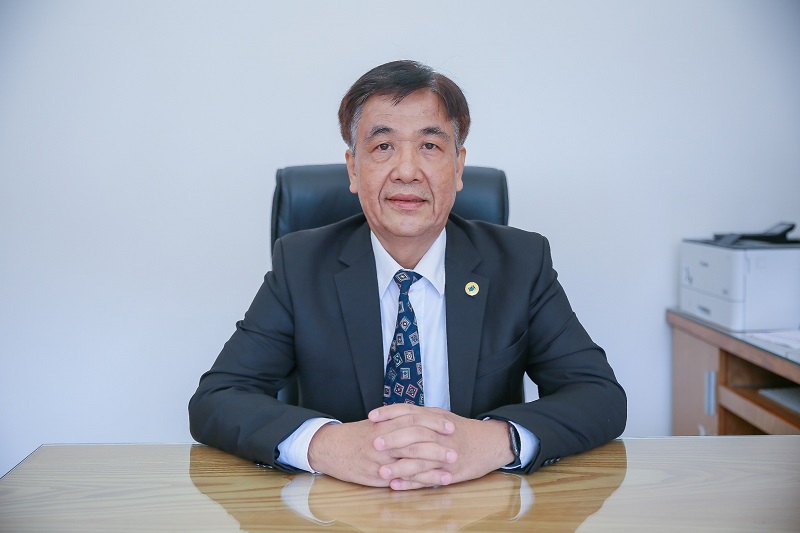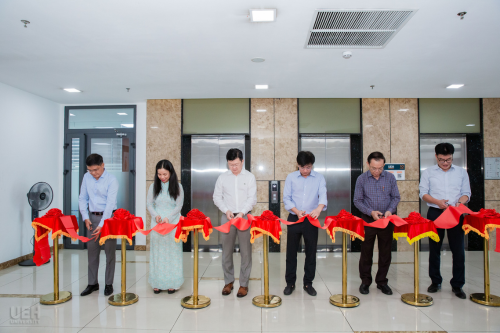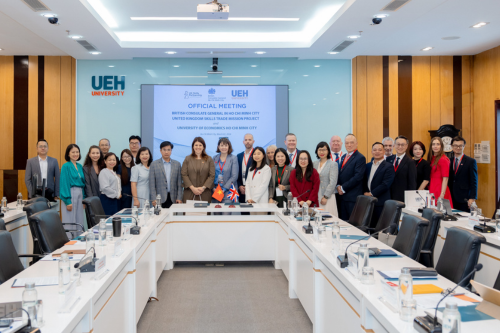
Digital transformation in universities: Online teaching will become an inevitable trend
06 Apr, 2021
In 2020 and early this year, the University of Economics Ho Chi Minh City (UEH) as well as many other universities, have to organize online teaching and learning to cope with the Covid-19 outbreak. However, in the period of dealing with the pandemic, online teaching and learning are becoming increasingly popular due to the demand for digital transformation in education. So what trend will online teaching and learning in higher education follow? How will UEH continue to apply digital transformation in higher education? We had an interview with Prof.Dr. Nguyen Trong Hoai - Vice President of University of Economics Ho Chi Minh City on this issue.

Prof.Dr. Nguyen Trong Hoai - UEH Vice President shared
1/ In the recent Covid-19 outbreak, many universities have implemented online lessons for students. At UEH, how was this activity organized over the past time?
For UEH, during the COVID-19 pandemic, online teaching and learning were carried out in the first wave from March 2020 to the latest after the Lunar New Year. That implementation is almost compulsory in the context of social distancing. The university has used online platforms from the LMS system built by the university, other platforms such as Google Meet, Microsoft Office, Zoom... to reach learners and convey the content of training programs at all levels to the learners. This form of online teaching basically copes with the context of social distancing; learners and teachers can approach each other to ensure the training programs can still work out normally. In general, the form of online teaching and learning at UEH over the past time has been very well deployed.
2/ In the implementation of online teaching over the past time, has the university encountered any difficulties?
There is a little problem because up to now, UEH lecturers are accustomed to teaching on popular online platforms using the LMS regularly regardless of social distancing. Activities that are usually organized in class, such as group discussion, teacher-student interaction, are still normal when teaching online. However, learners, especially learners who live in areas with weak and unstable Internet bandwidth, they also face difficulties. Still, this number accounts for a low rate and gradually, learners have also adapted to learning through online platforms.
3/ Is the student training quality assessment through this form of teaching affected?
Basically, up to this point, it does not affect much. The social distancing over the past time has not led to the need to take the online exams. However, UEH has tried this exam and has been supported by most students, which means that UEH has combined online and offline teaching and learning methods. Therefore, at the end of the course, teachers and students also can meet each other to discuss problems in the online teaching process and still deliver the offline exam as usual, so the output standard of the training program is still guaranteed. Currently, the Ministry of Education and Training has only recognized online teaching and learning but has not recognized the results of online exams because the monitoring system still has many limitations, especially in Vietnam.
4/ Online teaching and learning in recent years is quite popular in many forms of training due to rapid technological development. Do you think this will be an inevitable trend in the future with higher education, not a temporary solution during a pandemic?
That online teaching and learning have been deployed in recent social distancing are situational and trendy in the digital transformation process. Currently, all online teaching platforms are developing very quickly, not to mention that AI technology is gradually being applied more in the field of education. There are also courses around the world that are fully online. Still, these are courses for volunteers who only get a certificate following the lifelong learning approach with a tendency to improve skills and essential knowledge that they really need. The benefit of online teaching is that learners or teachers, whether in remote areas or different countries, can interact with each other through online platforms, reducing the commuting expenses for learners and teachers and inviting international experts and scholars. Online teaching is a trend, but after being deployed to deal with the context of the recent COVID-19 pandemic, this trend needs to be understood more correctly. "Blended learning" classrooms will tend to digitally transform when changing the approach from traditional to reverse classes where learners will actively learn first through online platforms with contents and learning materials preparation procedures being provided online. When the learning materials are posted on the online platform, learners can study in advance, and then the offline classroom is just a platform to interact, discuss and solve problems. Online teaching will complement offline teaching, which is the digital transformation trend in education, especially higher education. To do that, the training database must be systematically built according to this blended approach. Currently, UEH has gradually invested in a structural learning materials system for learners to access online. Each subject clearly states which content learners can learn online and what content must be learned face-to-face with the teacher. The learning materials system includes recorded lectures or images from teachers' lessons that are prepared in advance according to a unified outline of that subject.
5/ Does offline teaching and learning in a "blended" style, a combination of online and offline, take place at many universities in Vietnam?
Currently, there are very few schools that implement this method because to do this, the approach must be changed, from the tradition of being a teacher to a new student in the classroom to the model of "reverse classroom", which means the learners study in advance, then come to the class to discuss and interact with the lecturers to improve the creativity of learners and they now really play a central role if they really want to make an effort to acquire knowledge, competencies to turn into problem-solving capabilities in future professional practice.
6/ Looking at countries with advanced education, do you see how the trend of online teaching and learning is taking place?
In developed countries, educational background in the "blended" style has been in existence for ten years. Asian countries such as Singapore, Malaysia, Hong Kong (China)... have had a "blended" teaching platform for at least ten years. As for Vietnam, with the context of COVID-19, we can only understand online teaching in the traditional way of teaching, and in the "blended" style, there are only a few schools, among which the University of Economics Ho Chi Minh City is pursuing with its efforts to make initially experimental approach and then spread across the school.
7/ It can be said that online teaching and learning is only part of the digital transformation in higher education today. With UEH, over the years, how has the implementation of digital transformation in higher education been deployed?
The university has deployed quite a lot. Firstly, the university has built an intelligent library, which serves as a basis for uploading learning materials for learners to access through online platforms. The second is to upgrade the information technology infrastructure and increase the bandwidth capacity to not be congested in the online teaching and learning process. The third is to invest in a Simulation Center so that learners can play roles, interact, and discuss in groups after they have studied offline. Fourth, the university will set up a modern Studio for teachers to record their lectures to upload to the online platform.
8/ In 2021, how will the school continue to implement the digital transformation strategy in training and teaching?
The university is implementing advanced teaching programs, which means Top 200 with University and Top 100 with graduate, so this year will focus on reviewing this program, then rebuilding the outline of subjects towards a "blended" approach. This process will be conducted step by step and in the long term. There will be training courses for lecturers from many sides in the digital transformation process, including schools, partners, affiliated universities, etc... Besides, the university will also build a a digital foundation that evaluates learners according to the "blended" method, systematizes the parts into a unique system to perform the operational process’s management, including teaching and learning processes following the digital transformation approach. The general goal is to manage teaching and learning processes in a "real time" format, that is, the school can observe any class with a certain subject to know what learners are self-learning, what is the teacher teaching, this system expects to evaluate how many percent of the standard lesson output is achieved at that time. That is the university's expectation in the digital transformation of training activities.
Thank you teacher!
News, photos: Department of Marketing and Communication.





![[Research Contribution] Modernizing and Elevating Vietnamese Higher Education: Creating Breakthroughs in High-Caliber Human Resource Development and Talent Cultivation, Leading Research and Innovation](/images/upload/thumbnail/ueh-thumbnail-639083193174001549.png)

![[Research Contribution] Sustainable Manufacturing: A Driving Force for the Green Economy and the Challenges Ahead](/images/upload/thumbnail/ueh-thumbnail-639082294182922007.png)





